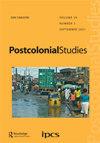The intellectual as partisan: Sylvia Pankhurst and the Italian invasion of Ethiopia
IF 1.8
3区 社会学
Q2 CULTURAL STUDIES
引用次数: 1
Abstract
ABSTRACT This article examines the feminist, communist and antifascist campaigner Sylvia Pankhurst as a postcolonial intellectual for our times. A forgotten figure in the history of anticolonialism, Pankhurst was active in the suffragette movement and then the communist movement, before devoting her political energies to supporting Ethiopia against the Italian invasion led by Mussolini in 1935. Pankhurst’s broadsheet New Times and Ethiopia News published articles denouncing the Italian occupation as well as writing by prominent African and Asian anticolonial voices. Through the analysis of Pankhurst, this article argues for an understanding of the postcolonial intellectual as a partisan who cuts across civilizational divides, bringing together metropolitan and colonial networks of resistance. I draw on Carl Schmitt’s Theory of the Partisan in which he describes the partisan, exemplified in the political combatant of the wars of decolonization, as the emblematic figure of twentieth-century warfare. I adapt Schmitt’s theory to read Pankhurst’s militancy in favour of Ethiopia in order to argue that the partisan is not only an insurgent fighter but an individual who takes sides in the interconnected struggles against colonialism and fascism. I thus gesture to the possibility of a global theory of resistance.作为党派的知识分子:西尔维娅·潘克赫斯特和意大利入侵埃塞俄比亚
本文将女权主义者、共产主义者和反法西斯活动家西尔维娅·潘克赫斯特作为我们时代的后殖民知识分子进行研究。潘克赫斯特在反殖民主义历史上是一个被遗忘的人物,她活跃于妇女参政运动和共产主义运动,之后在1935年将她的政治精力投入到支持埃塞俄比亚反对墨索里尼领导的意大利入侵。潘克赫斯特的大报《新时报》和《埃塞俄比亚新闻》发表了谴责意大利占领的文章,并发表了非洲和亚洲著名反殖民主义者的文章。通过对潘克赫斯特的分析,本文主张将后殖民知识分子理解为跨越文明鸿沟的党派,将大都市和殖民地的抵抗网络结合在一起。我引用了卡尔·施密特的《党派理论》,他在书中描述了党派,以非殖民化战争中的政治战士为例,作为20世纪战争的象征人物。我改编了Schmitt的理论来解读Pankhurst支持埃塞俄比亚的战斗性,以证明游击队不仅是一名叛乱战士,而且是在反对殖民主义和法西斯主义的相互关联的斗争中站在一边的个人。因此,我提出了一种全球抵抗理论的可能性。
本文章由计算机程序翻译,如有差异,请以英文原文为准。
求助全文
约1分钟内获得全文
求助全文

 求助内容:
求助内容: 应助结果提醒方式:
应助结果提醒方式:


